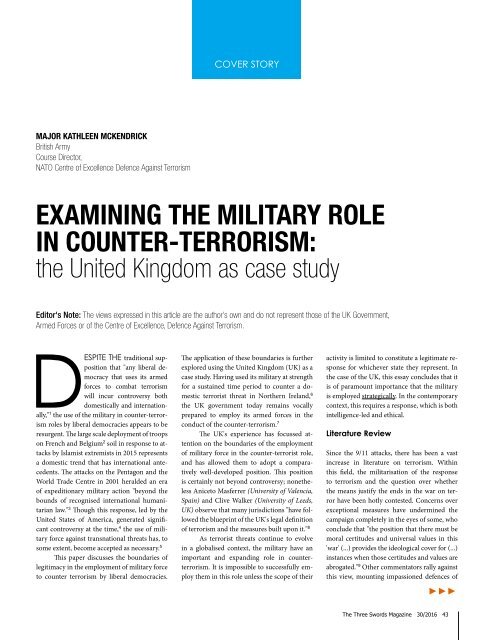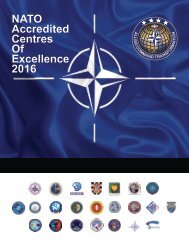TRIDENT ISSUE
7201_JWC_May2016_Magazine_ORIG_Low
7201_JWC_May2016_Magazine_ORIG_Low
You also want an ePaper? Increase the reach of your titles
YUMPU automatically turns print PDFs into web optimized ePapers that Google loves.
COVER STORY<br />
MAJOR KATHLEEN MCKENDRICK<br />
British Army<br />
Course Director,<br />
NATO Centre of Excellence Defence Against Terrorism<br />
EXAMINING THE MILITARY ROLE<br />
IN COUNTER-TERRORISM:<br />
the United Kingdom as case study<br />
Editor's Note: The views expressed in this article are the author's own and do not represent those of the UK Government,<br />
Armed Forces or of the Centre of Excellence, Defence Against Terrorism.<br />
DESPITE THE traditional supposition<br />
that "any liberal democracy<br />
that uses its armed<br />
forces to combat terrorism<br />
will incur controversy both<br />
domestically and internationally,"<br />
1 the use of the military in counter-terrorism<br />
roles by liberal democracies appears to be<br />
resurgent. The large scale deployment of troops<br />
on French and Belgium 2 soil in response to attacks<br />
by Islamist extremists in 2015 represents<br />
a domestic trend that has international antecedents.<br />
The attacks on the Pentagon and the<br />
World Trade Centre in 2001 heralded an era<br />
of expeditionary military action "beyond the<br />
bounds of recognised international humanitarian<br />
law." 3 Though this response, led by the<br />
United States of America, generated significant<br />
controversy at the time, 4 the use of military<br />
force against transnational threats has, to<br />
some extent, become accepted as necessary. 5<br />
This paper discusses the boundaries of<br />
legitimacy in the employment of military force<br />
to counter terrorism by liberal democracies.<br />
The application of these boundaries is further<br />
explored using the United Kingdom (UK) as a<br />
case study. Having used its military at strength<br />
for a sustained time period to counter a domestic<br />
terrorist threat in Northern Ireland, 6<br />
the UK government today remains vocally<br />
prepared to employ its armed forces in the<br />
conduct of the counter-terrorism. 7<br />
The UK's experience has focussed attention<br />
on the boundaries of the employment<br />
of military force in the counter-terrorist role,<br />
and has allowed them to adopt a comparatively<br />
well-developed position. This position<br />
is certainly not beyond controversy; nonetheless<br />
Aniceto Masferrer (University of Valencia,<br />
Spain) and Clive Walker (University of Leeds,<br />
UK) observe that many jurisdictions "have followed<br />
the blueprint of the UK's legal definition<br />
of terrorism and the measures built upon it." 8<br />
As terrorist threats continue to evolve<br />
in a globalised context, the military have an<br />
important and expanding role in counterterrorism.<br />
It is impossible to successfully employ<br />
them in this role unless the scope of their<br />
activity is limited to constitute a legitimate response<br />
for whichever state they represent. In<br />
the case of the UK, this essay concludes that it<br />
is of paramount importance that the military<br />
is employed strategically. In the contemporary<br />
context, this requires a response, which is both<br />
intelligence-led and ethical.<br />
Literature Review<br />
Since the 9/11 attacks, there has been a vast<br />
increase in literature on terrorism. Within<br />
this field, the militarisation of the response<br />
to terrorism and the question over whether<br />
the means justify the ends in the war on terror<br />
have been hotly contested. Concerns over<br />
exceptional measures have undermined the<br />
campaign completely in the eyes of some, who<br />
conclude that "the position that there must be<br />
moral certitudes and universal values in this<br />
'war' (...) provides the ideological cover for (...)<br />
instances when those certitudes and values are<br />
abrogated." 9 Other commentators rally against<br />
this view, mounting impassioned defences of<br />
►►►<br />
The Three Swords Magazine 30/2016 43



